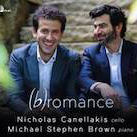

Nicholas Canellakis & Michael Stephen Brown: (b)romance
First Hand Records
As harmonious as it is, the relationship cellist Nicholas Canellakis and pianist Michael Stephen Brown have enjoyed for over fifteen years hasn't been without occasional moments of friction, but that's to be expected when the two are brutally honest with each other. If anything, such candour has been for the betterment of their union as friends and colleagues. When Canellakis responded less than enthusiastically to the first part of Brown's Prelude and Dance, for example, the pianist created a replacement that was met with a more positive assessment. Like any long-time musical duo, the two catalyze their creative and interpersonal connection into performances of passion and vitality.
That's resoundingly evident on their second duo album, which, true to its title, is as much romance, curatorially speaking, as bromance. In fact, romance is directly referenced in four of the thirteen titles, specifically in material by Saint-Saëns, Fauré, Schumann (Clara), and Canellakis himself. Adding to the release's appeal, the wide-ranging set features pieces by Copland, Debussy, Sibelius, Gershwin, Rachmaninov, Ginastera, and Don Ellis, as well as works by the cellist and pianist. The three by Brown and Canellakis—two by the former, one the latter—are premiere recordings, as are the cellist's arrangements of Gershwin and Ellis.
Outside their duo project, the two have multiple irons in the fire. A graduate of The Juilliard School, Brown's profile as a composer is ever-growing, and he's issued a number of albums as a solo artist and in collaboration with others aside from Canellakis, pianist Jerome Lowenthal and violinist Elena Urioste. In addition to performing concertos with numerous orchestras and recitals, the cellist is the artistic director of Arizona's Chamber Music Sedona and has produced, directed, and starred in several short films and music videos.
Throughout the sixty-eight-minute recording (laid down at Oktaven Audio in January 2023), Canellakis coaxes the warmest of sounds from his 1840 Jean-Baptiste Vuillaume cello and Brown's his attentive partner every step of the way. The oft rhapsodic tone of the release is established early with a lovely, heartfelt rendering of Saint-Saëns' Romance, Op. 36 and carries on from there. The gentle second movement of Schumann's Piano Concerto, Op. 7, “Romanze” exudes an entrancing, slow-motion lilt that's easy to embrace, after which Debussy's as-delicate Beau soir perpetuates its fragility. Following as it does Fauré's expressive Romance, Op. 69, Canellakis's crepuscular Romance à GF naturally identifies as an homage to the French composer—even if the cellist's coy about who the initials stand for. Regarding “Poème,” Canellakis rightly opines that this early, unpublished evocation sounds more like Debussy than Copland; regardless, it's a lovely romantic exercise whose hush showcases the musicians' exceptional command of their instruments. Here and elsewhere, the rapport between the two amplifies the lyrical tenderness of the material.
Dubbed “classic Americana” by Canellakis, Lukas Foss's rollicking Capriccio emphasizes the release's livelier side and sees the virtuosic duo venturing confidently into folk and blues idioms. One's ears perk up the moment Gershwin's enticing 3 Preludes appears, be it the swinging “Allegro ben ritmato e deciso,” bluesy “Andante con moto e poco rubato,” or jubilant “Allegro ben ritmato e deciso.” Ending the release on a spirited note is Ellis's Bulgarian Bulge, originally written for big band but no less infectious in the cellist's duo arrangement. At the darker end of the spectrum is Sibelius's Malinconia, Op. 20, a grief-stricken expression crafted in response to the death of his infant daughter. At eleven minutes, it towers over the shorter settings and progresses through a series of contrasting moods that mirror the emotional extremes a family experiences in the face of tragedy. As sombre as it is, passages of high energy and affirmation hint at the possibility of recovery from loss. Occasionally solemn but boisterous too is Ginastera's homage to the vast plains of the Pampas, Pampeana No. 2, Op. 21.
As composers, Brown distinguishes himself with Prelude and Dance, its first part enticing for its reflective, serene character and its second arresting for its hellacious drive. His 35 Chords for Nick is memorable too. Reminiscent of Leonard Bernstein's anniversary pieces, Brown's gotten in the habit of writing chord compositions for friends celebrating milestone birthdays, and this piece for his cellist partner leaves an impression despite its brevity. Apparently, Brown and Canellakis are fierce scrabble competitors whose matches sometimes push their friendship to the limit but also make them stronger players. The two infuse (b)romance with similar degrees of ferocity and conviction.March 2024